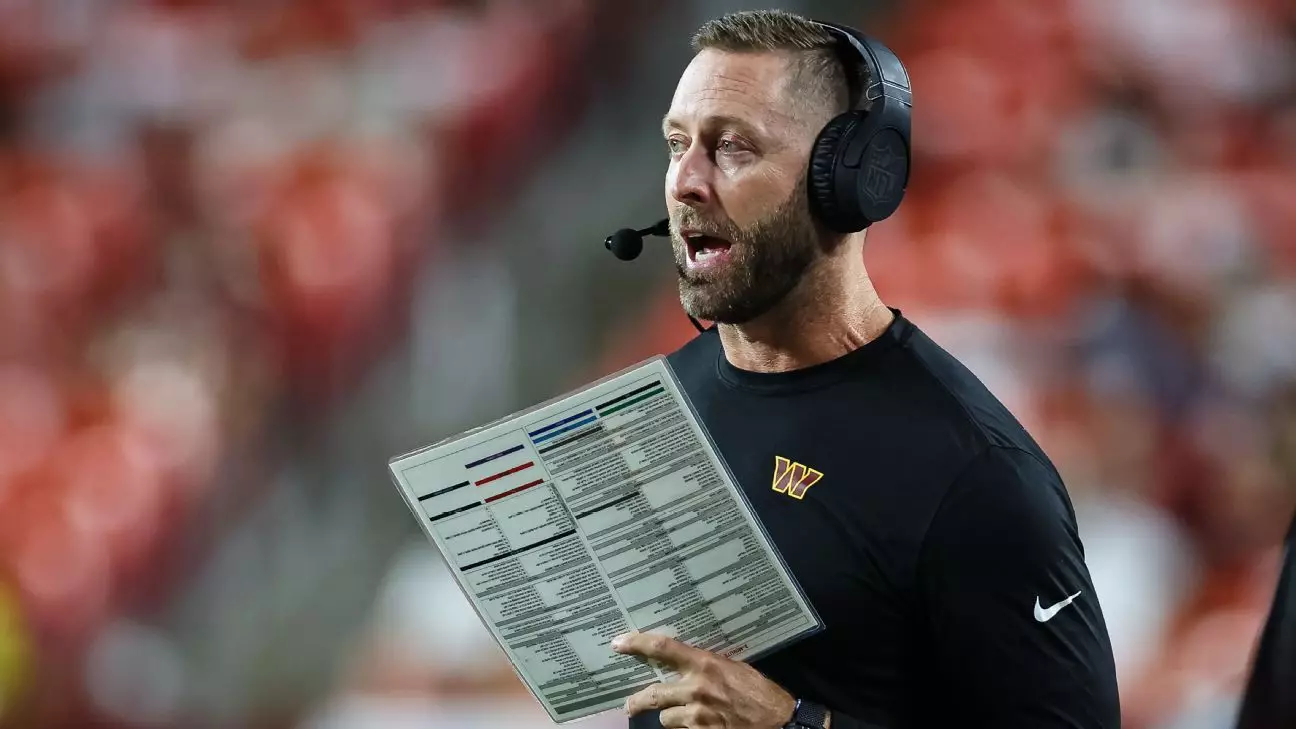In any team sport, synchronized execution depends heavily on consistency, and this principle is painfully evident in the Washington Commanders’ current struggle with offensive continuity. Despite possessing talented personnel and a record of offensive success in recent seasons, the team faces an uphill battle to develop the chemistry necessary for peak performance. The key obstacle stems from a series of injuries and absenteeism, which have hamstrung the offensive unit’s ability to gel during the crucial pre-season phase.
The absence of star wide receiver Terry McLaurin exemplifies this challenge. While his physical presence in practice isn’t necessarily the sole factor for success, his limited contact with quarterbacks and fellow receivers means the team is driving without its full engine. Similarly, other pivotal players—such as guards Brandon Coleman and Sam Cosmi—are sidelined or recovering from injuries. These setbacks hinder the offensive line’s ability to operate as a cohesive unit, making it difficult to implement complex blocking schemes or to develop route chemistry.
In practice, these absences do more than stall physical development; they impede the formation of trust and anticipatory timing, which are vital in an NFL offense. As the season looms, the collective uncertainty becomes more pressing; without everyone on the field simultaneously, it’s challenging to evaluate how well the offensive scheme will function once truly in game-mode. This scattered approach means that players are forced to improvise, and the coaching staff must focus on simple concepts instead of refining sophisticated plays.
Strategic Implications: Building Chemistry Under Constraints
Offensive coordinators like Kliff Kingsbury understand authenticity is forged through repetition and shared experience. While acknowledging the setbacks caused by injuries and absences, Kingsbury emphasizes the importance of time on task. His belief is that chemistry cannot be hurried; it requires sustained interaction and deliberate practice, which is currently compromised.
The absence of McLaurin and other key players delays the development of crucial relationships, notably between quarterback Jayden Daniels and McLaurin. Last year, this pairing was highly productive—McLaurin’s impressive 13 touchdowns were largely facilitated by Daniels’ precise throws and understanding of his receiver’s tendencies. Yet last season’s success was built on a foundation of familiarity and continuous reps, which are now lacking in the current camp.
Given this context, the focus shifts from executing complex schemes to establishing basic trust and understanding. While the team’s past offensive achievements—ranking fifth in points and seventh in yards—highlight its potential, the reality today is that the team must overlook glitzy play-calling for a more pragmatic approach rooted in fundamental execution, patience, and resilience.
The Commanders’ offensive plans have been significantly affected by roster disruptions. The addition of upgrades like Deebo Samuel and Laremy Tunsil, along with a high draft pick in Josh Conerly Jr., signals a clear intent to improve their offensive arsenal. However, talent alone cannot compensate for the lack of chemistry and practice time. The team must find a way to extract productivity from the players available, emphasizing adaptability and mental toughness.
From a strategic standpoint, this situation presses football operations to innovate on the fly. Coaches need to design simplified schemes that can be executed effectively without extensive reps, focusing on creating quick-hitting plays that capitalize on individual talent. Moreover, nurturing the remaining healthy players’ confidence becomes essential in maintaining competitive momentum.
The challenge extends beyond mere physical readiness; it demands a mental recalibration. Players like McLaurin, who are seeking contract extensions, must realize that their readiness and collaboration with the quarterback will determine their roles in a potentially explosive offense. Building rapport in a limited window requires intentional, high-quality interactions—something difficult but not impossible to achieve.
Looking Ahead: Turning Adversity Into Opportunity
As the season edges closer, the narrative must shift from lamenting injuries to strategizing around them. The Commanders’ experience illustrates a common truth in professional sports: resilience is often born from adversity. Coaches like Kingsbury are tasked with the delicate balancing act of managing expectations while galvanizing their squad to perform amid challenges.
This period serves as a testing ground for the team’s depth, adaptability, and leadership. It’s a stark reminder that talent alone isn’t enough; coordination, timing, and trust are cultivated through practice—yet practice is limited by circumstances. Therefore, the team must maximize every rep they get, no matter how imperfect, and foster a mindset of relentless improvement.
In essence, the Commanders’ current predicament underscores a powerful lesson: the foundation for offensive success isn’t just about skill or play design; it’s about character, patience, and strategic resilience. These qualities will determine whether they can transform their current obstacles into a springboard for a formidable season.

